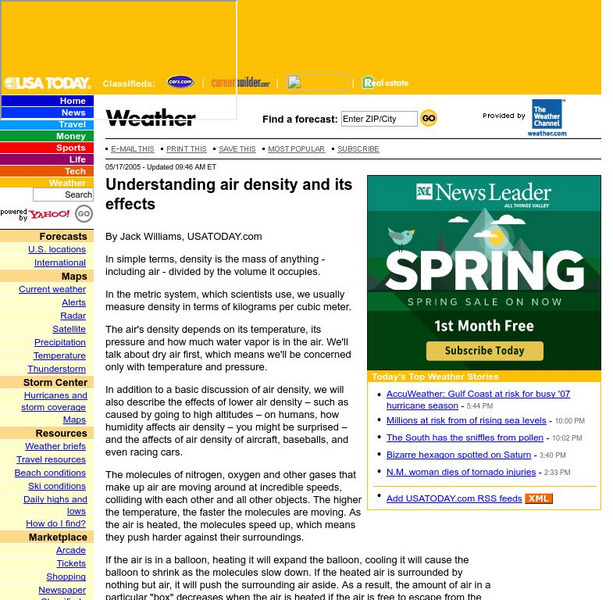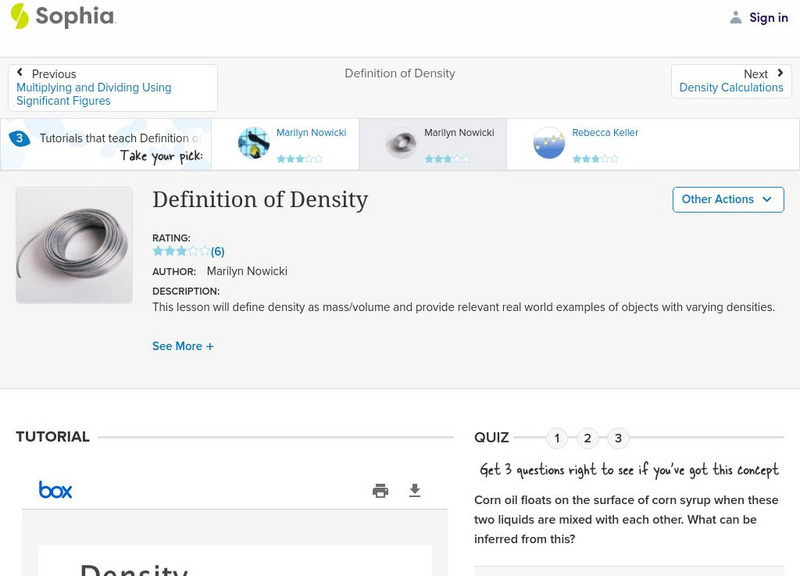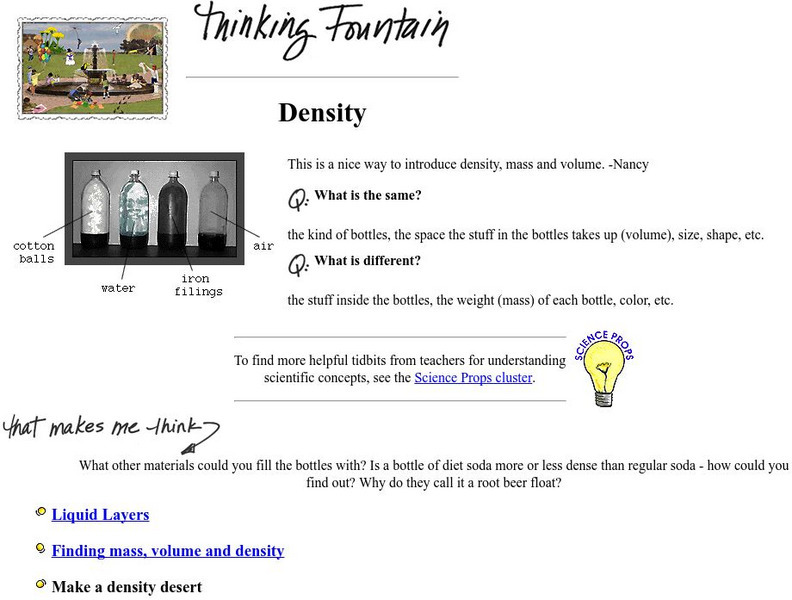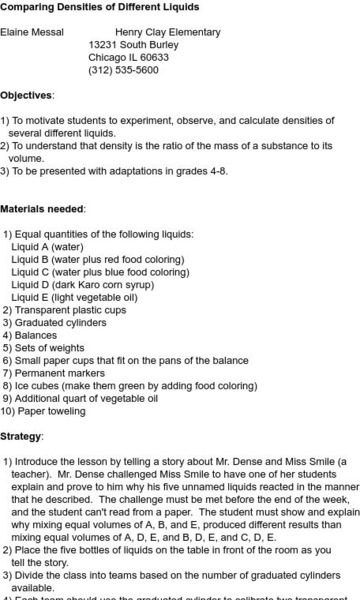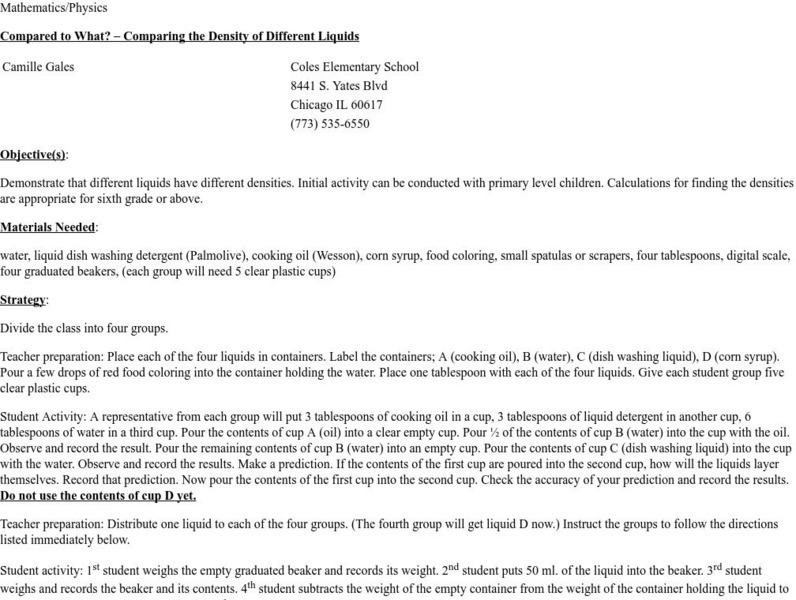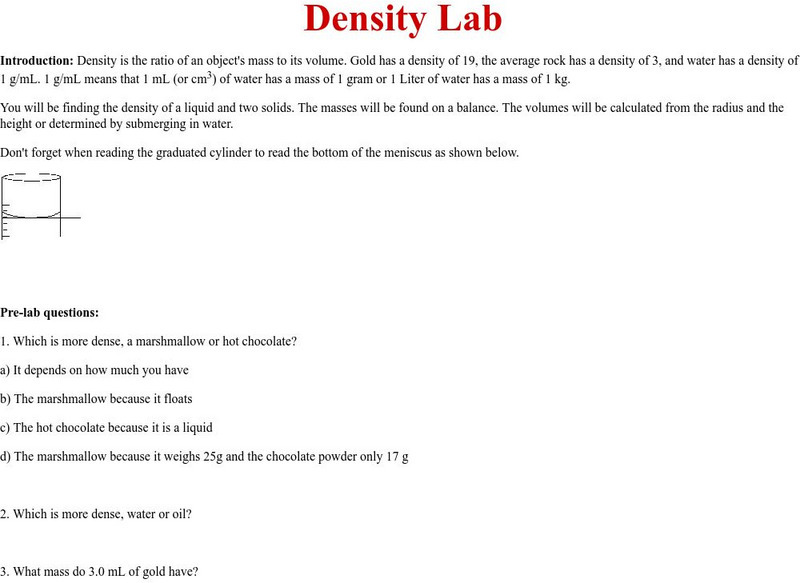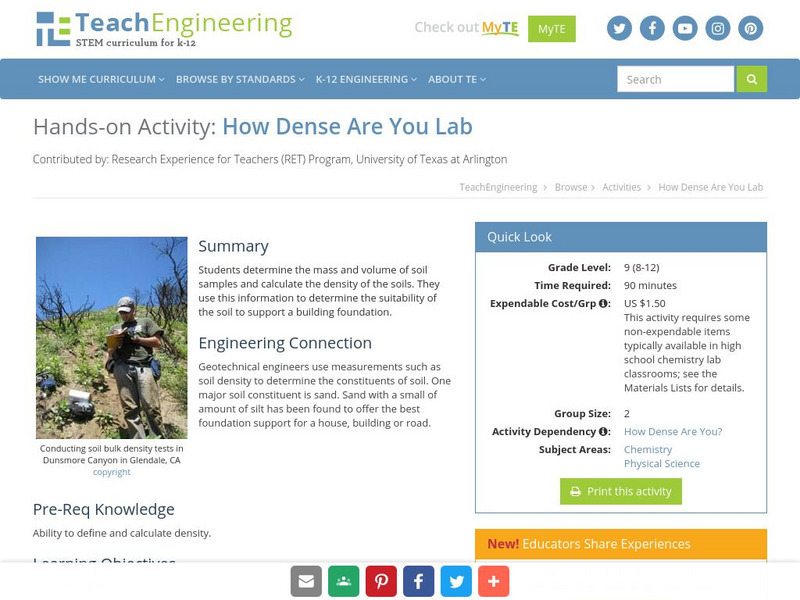Hi, what do you want to do?
Science Education Resource Center at Carleton College
Serc: Investigating Density: Determined by Using Mass and Volume of a Substance
In this activity, students investigate the history of density, its uses, and applications. Students will generate and calculate data applying it to a graph. They will be looking at the relationship between mass and volume.
Science Education Resource Center at Carleton College
Serc: Investigating Floating and Sinking: Density
This investigation introduces the concepts of volume, mass, and density and how they interact. Students will make predictions of whether an object will float or sink after finding mass and volume of an object.
Science Education Resource Center at Carleton College
Serc: Mineral Density: Teaching Accuracy, Slope, and Percent Error
Students explore the meaning of density and use their math skills to graph mass/volume data, write an equation for a line, and interpret the slope of the line. Students also find the density of two unknown mineral samples and use those...
University of California
Ucla K 6 Physics/astronomy: Mass, Weight, and Density
This website provides explanations of mass, weight, and density with directions for building simple scales and balances. Provided as encouragement to teach these concepts to young children, it offers a good review for older students.
Science Education Resource Center at Carleton College
Serc: Density of Solid Objects
In this science inquiry, students investigate whether volume or density of objects determine the floating or sinking in water. Using a rock and a block of wood teachers engage students in the discussion of density, mass and volume.
CK-12 Foundation
Ck 12: Fifth Grade Science: Physical Science: Matter, Mass, and Volume
This learning module discusses the definition of matter and what mass and volume measure. Module includes pictures, videos, and review questions.
Middle School Science
Mss: Density Demonstration: Coke vs. Diet Coke
In this demonstration, students will brainstorm to find a solution as to why Diet Coke floats and Coke sinks. Through this exercise students will arrive at a definition of density.
Science Education Resource Center at Carleton College
Serc: Measuring and Comparing Matter
In this activity, learners will measure a variety of different materials from the classroom to determine how much matter is found in these materials then determine the mass of these materials using the same volume for each. The data will...
USA Today
Usa Today: Understanding Air Density and Its Effects
In simple terms, density is the mass of anything - including air - divided by the volume it occupies. In the metric system, which scientists use, we usually measure density in terms of kilograms per cubic meter. The air's density depends...
PBS
Pbs Learning Media: Floating and Sinking: Hot Air Balloons
Why do hot air balloons float? This resource from the NOVA Web site offers a series of interactive activities that illustrates the physics of hot air balloons.
Illustrative Mathematics
Illustrative Mathematics: G Mg How Many Cells Are in the Human Body?
About how many cells are in the human body? The purpose of this task is for learners to apply the concepts of mass, volume, and density in a real-world context. Aligns with G-MG.A.2.
Sophia Learning
Sophia: Definition of Density: Lesson 2
This lesson will define density as mass/volume and provide relevant real world examples of objects with varying densities. It is 2 of 3 in the series titled "Definition of Density."
CK-12 Foundation
Ck 12: Physical Science: Density
[Free Registration/Login may be required to access all resource tools.] Definition of density and how to calculate density.
Science Museum of Minnesota
Science Museum of Minnesota: Thinking Fountain: Density
An introduction to density, mass, and volume with links to related books and activities.
Calculator Soup
Calculator Soup: Density Calculator
Choose a calculation for density p, mass m or Volume V. Enter the other two values and the calculator will solve for the third in the selected units.
California State University
Csudh: Chemistry: Density, Mass and Volume Homework
Practice your density, mass, and volume calculations with these interactive review problems.
California State University
Csudh Project for Chemistry: Mass, Density, and Volume
Use these word problems as a review in the areas of mass, density, and volume.
Science and Mathematics Initiative for Learning Enhancement (SMILE)
Smile: Comparing Densities of Different Liquids
This lab experiment has students observe and compare the density of five different liquids while measuring mass and volume.
Science and Mathematics Initiative for Learning Enhancement (SMILE)
Smile: Comparing Liquid Density
Because different liquids have different properties, density also differs. In this lesson from the Illinois Institute of Technology, students will calculate densities of water, dish-washing detergent, cooking oil, and other liquids.
Other
Lapeer County Schools Science Resources: Density Lab
A simple lab experiment for students to find the density of two solids and a liquid (does not use water displacement). Note that number 1d should not state "weighs" since mass is being found.
Other
Ask Numbers: Measurement Conversion Calculators and Charts
What kind of unit conversion would you like to do? This site will allow you to do a multitude of conversions. Just click on the specific measurement you are needing to convert. It also provides a history of measurements and a chart of...
Alabama Learning Exchange
Alex: Density
Density is the ratio of mass to volume. Density will be introduced to students by a demonstration of coke verses diet coke. The teacher will then solve density problems for the students on the board. The class will then complete a lab on...
TeachEngineering
Teach Engineering: How Dense Are You Lab
Students determine the mass and volume of soil samples and calculate the density of the soils. They use this information to determine the suitability of the soil to support a building foundation.
Chem4kids
Chem4 Kids: Symbols in Chemical Equations
Chem4Kids! provides an overview of the symbols representing numerical values in chemical equations. Each symbol is defined and described.












